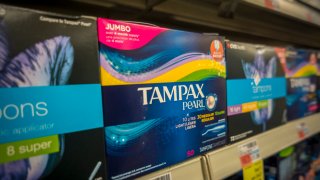
As Shelley Aragoncillo was scrolling through her local “buy nothing” social media groups, she noticed a trend. If someone offered free tampons or pads, loads of people requested them. It seemed like there was a huge, unmet need. This sparked an idea for Aragoncillo: What if she offered these products to people in the community discreetly and without cost, like a little free library but for menstrual products?
“I was thinking, ‘This should not be an item that’s inaccessible,’ and also recognizing that the pandemic was causing so many hardships,” Aragoncillo, 33, of Philadelphia, told TODAY. “Period poverty is a public health crisis and period poverty combined with period stigma just makes accessibility to these products limited — especially for those communities that are historically underserved.”
But first, Aragoncillo needed to figure out the logistics of distributing free menstrual products. She hoped to find a shed because she wanted it to be “waterproof and to withstand the elements,” while offering privacy. Then she needed to decide where to put it and opted to place it on the edge of her property so she could easily refill and clean it. But she didn’t select a spot that was convenient just to her.
“I live in an area of South Philly that is made up of communities, people of different racial and ethnic groups, and a lot of those groups are communities that are historically underserved,” she explained. “I figured that (putting the shed) in our direct community would be best.”
Get Southern California news, weather forecasts and entertainment stories to your inbox. Sign up for NBC LA newsletters.
To find a shed, she went back to the buy nothing communities to explain her project and see if anyone had one. That’s when her idea really took off.
“People from day one were like, ‘We want to donate product.’ ‘We want to donate money,’ which I had never even thought of or expected,” Aragoncillo said. “The response in the community was truly amazing.”
She calls the shed the "Grab-n-Flow," and about three to five people each day use it to get free tampons and pads. People can access it 24/7 without interacting with Aragoncillo or anyone else. Over the past year, she estimates there have been more than 1,000 visits to the shed.
U.S. & World
News from around the country and around the globe
“You can take whatever you want,” she said. “The great thing about the shed is people even donate open boxes or tampons because everything is individually wrapped. It’s still safe and sanitary and people take those.”
While she doesn’t keep tabs on who accesses the shed, she has been pleased to discover people don’t just take, they also give.
“It has really turned into a mutual aid model. I would say we get donation drop-offs constantly,” she said. “You could walk up as someone who wanted to access the shed any day and there would be product in there.”
The greater Philadelphia community has also noticed Grab-n-Flow’s impact. The Maternal and Infant Health Community Action Network and the Free Library of Philadelphia are partnering with the Grab-n-Flow to expand its services. With these new relationships, the sheds will also offer pregnancy tests, diapers and formula. Aragoncillo also received a Penn Cares grant from Penn Medicine — where she works as a research coordinator in the family planning division — to help start a new location, possibly by one of the library's locations.
Thanks to donations, her basement is full of menstrual products and she has funds to buy more if needed.
While she knows that breaking period stigma and tackling period poverty will take more than just her volunteer efforts, she believes the Grab-n-Flow can be a step toward ending both.
“My hope with the shed is that we can include zines on menstruation or information on how to speak to your child,” Aragoncillo said. “If we can give people these resources in private and in a way that works for them to speak to their children then maybe we can tackle period stigma. And I think that by tackling period stigma we can help tackle period poverty.”
This story first appeared on TODAY.com. More from TODAY:



